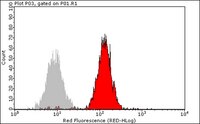Co-localization of angiotensin-converting enzyme 2-, octomer-4- and CD34-positive cells in rabbit atherosclerotic plaques.
Anthony Zulli, Sudarshan Rai, Brian F Buxton, Louise M Burrell, David L Hare
Experimental physiology
93
564-9
2008
Show Abstract
Angiotensin-converting enzyme 2 (ACE2) is a novel enzyme with possible implications in the treatment of blood pressure disorders. Recent evidence suggests that an upregulation of ACE2 can be stimulated by all-trans retinoic acid (at-RA); however, at-RA also affects regulation of the stem-cell marker octomer-4 (Oct-4) and thus cellular differentiation. We have previously shown that smooth muscle cells and macrophages present within rabbit atherosclerotic plaques are positive for ACE2, Oct-4 and the haematopoietic stem-cell marker CD34. Thus, to provide evidence that possible at-RA treatment could affect both plaque cellular biology (via effects on cellular differentiation) and blood pressure (via ACE2), it is vital to show that cells with atherosclerotic plaques co-express all three markers. Thus, we sought to provide evidence that a subset of cells within atherosclerotic plaques is positive for ACE2, Oct-4 and CD34. We used New Zealand White rabbits that were fed a control diet supplemented with 0.5% cholesterol plus 1% methionine for 4 weeks and then allowed to consume a normal diet for 10 weeks. Immunohistochemistry was performed by standard techniques. We report that ACE2, Oct-4 and CD34 were all present within atherosclerotic plaques. Although macrophages were positive for all three markers, spindle-shaped cells in the media did not show all three markers. The endothelium overlying normal arterial wall showed positive Oct-4 and ACE2 immunoreactivity, but CD34 immunoreactivity was patchy, indicating that such cells might not have fully differentiated. It is concluded that cells in atherosclerotic plaques express co-express ACE2, Oct-4 and CD34. Further studies aimed at establishing the effects of all-trans retinoic acid on blood pressure and atherosclerotic cell differentiation are warranted. | 18192339
 |











